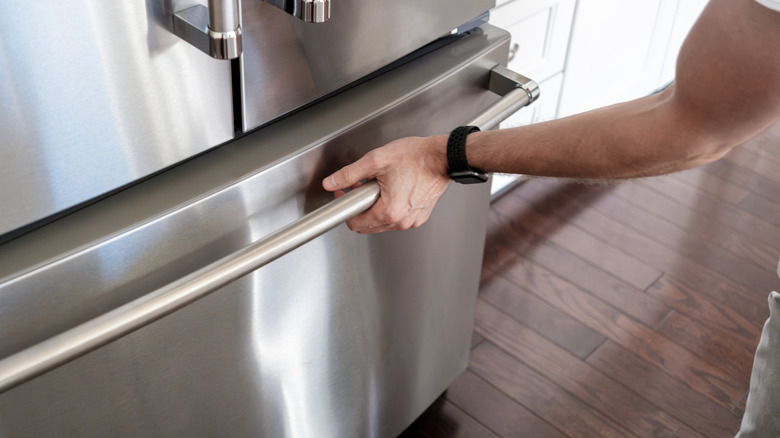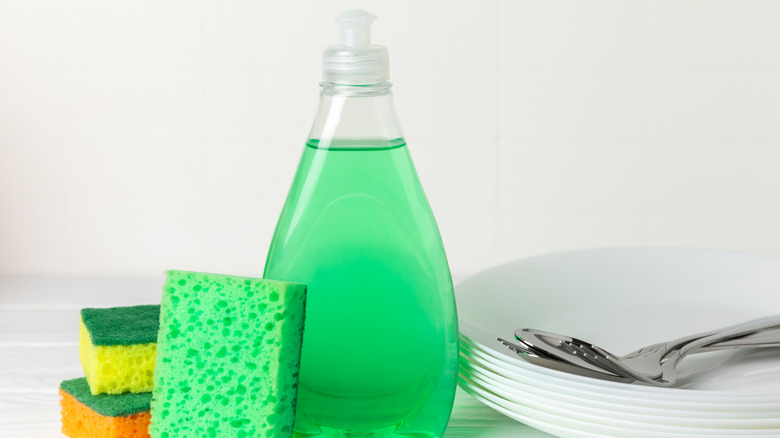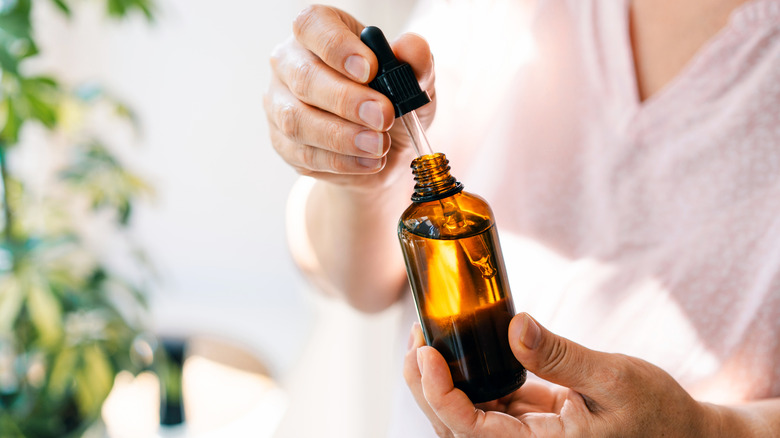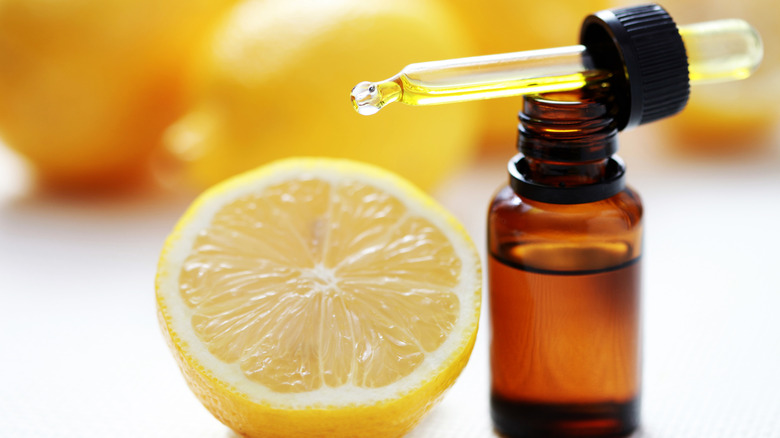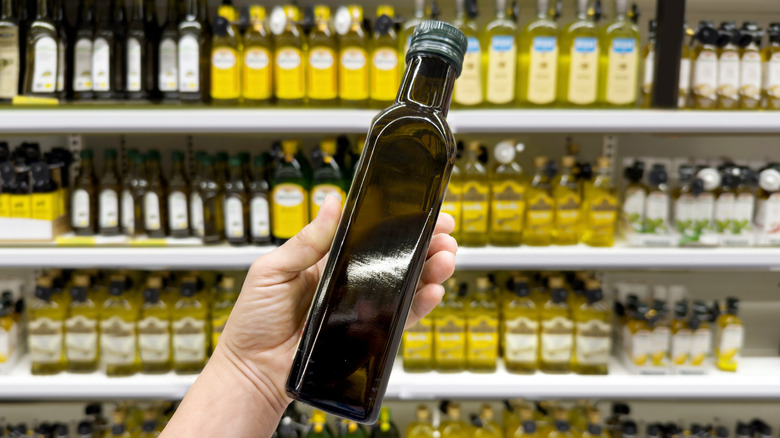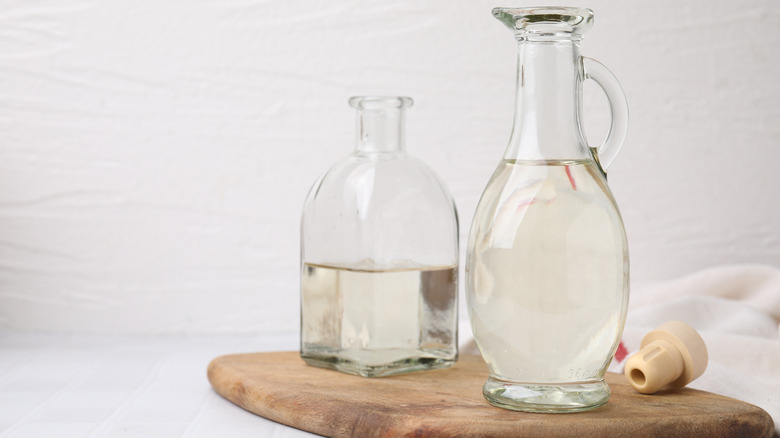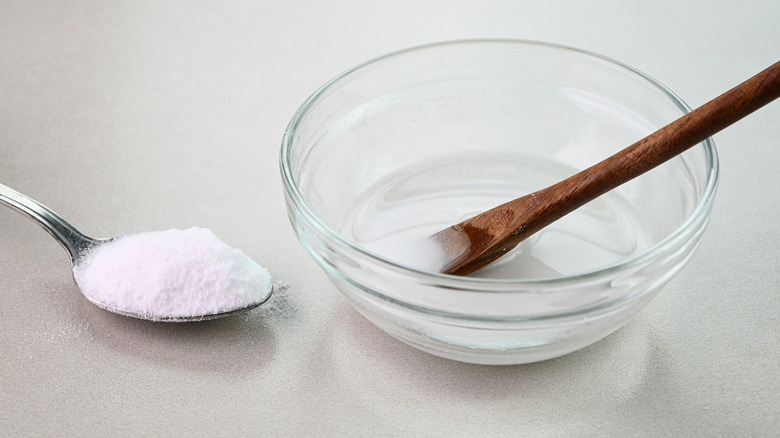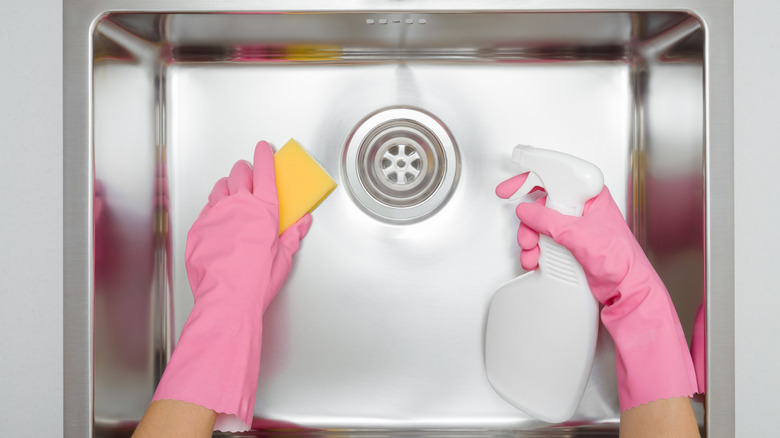The 7 Best Ways To Clean Stainless Steel To Keep Your Appliances Sparkling
We may receive a commission on purchases made from links.
Stainless steel appliances continue to reign in popularity, thanks to their contemporary aesthetics. Unlike standard white appliances, which are still more budget-friendly, busy families are still trending to stainless steel because of the material is easier to clean. Once you have installed a new stainless steel refrigerator, dishwasher, or washing machine, however, you may also notice that the material shows a lot more fingerprints. Stainless steel also isn't completely immune to dirt and stains. Therefore, in order to maintain the appearance and protect the integrity of stainless steel appliances, it's important to know the best ways to clean them.
Commercial cleaning agents, like CLR stainless steel cleaner, are always an option for stainless steel appliances. However, these aren't necessary for all cleaning jobs. What's more, you may be looking for chemical-free solutions without the high cost of home improvement store-bought goods. If you fall into this camp, there good news is there are several DIY methods for removing everyday messes, smudges, and stains from your stainless steel appliances.
Dish soap can work for everyday messes
When it comes to cleaning up your stainless steel stove, refrigerator, or dishwasher after cooking a meal, you don't necessarily have to use any fancy cleaners. In these cases, regular kitchen dish soap can handle everyday messes. Dish soap tackles grease and dirt thanks to its molecules that bond to these items when combined with water. This solution can even help get rid of fingerprint smudges on refrigerators, as well as water streaks on dishwashers.
To clean up these types of everyday messes, run a clean sponge under warm water. Add a few drops of dish soap and then squeeze a few times, similar to how you might prepare for washing dishes. Apply directly to the stainless steel appliance you are cleaning, making sure you scrub in the direction of the grain. (If you clean against the grain, you might accidentally scratch your appliances!)
Rinse the soap off with a clean damp sponge or microfiber cloth. Then, dry the water with either a sturdy paper towel or a second microfiber cloth to help prevent water streaks from forming. If you're left with spots, this could indicate a high mineral content in your tap water, and you might consider using distilled water for cleaning instead.
Certain essential oils may also help clean stainless steel
If you're a fan of using aromatherapy in your home, chances are you might have essential oils on hand. Certain types of these oils might even help clean stainless steel appliances. In particular, eucalyptus and lemon essential oils may be useful for such purposes. On top of this, lemon essential oil is known to have antimicrobial properties, which may help you safely tackle germs on your appliances. The key with using any essential oil, including for cleaning home appliances, is to dilute them with water.
There are a couple of methods you can try. The first involves combining 10 drops of either essential oil with ⅛ cup white vinegar and 1 teaspoon baking soda into an 8-ounce spray bottle. Fill the rest of the space with hot water and shake well. Another option is to combine a few drops of essential oils with 1 tablespoon olive oil, ½ cup white vinegar, and ½ cup of warm water. Spray the solution directly onto the appliance and wipe it away with a paper towel or microfiber cloth. Make sure that you cover the entire surface of the appliance for a sparkling clean. Also, test a small area of the appliance with the spray beforehand to make sure it doesn't leave any streaks or residue.
Use lemon oil to polish stainless steel
Despite regular cleanings, stainless steel appliances can lose their luster and quickly look unclean due to fingerprints. Before you spend money on commercial polishing sprays, consider a little bit of lemon oil to restore the look of your appliances. Unlike lemon essential oil, which is derived from the fruit of lemons, lemon oil is made from their distilled peels. You can tell the difference between them by their color. While lemon essential oil is aromatic and yellow in color, lemon oil is usually clear or white. Citrus peels contain a compound called d-limonene, which can help break down oily substances.
Lemon oil works best when used between everyday cleanings, but you can also use it any time you want to remove fingerprints or make your stainless steel appliances really shine. To use this method, take a clean microfiber cloth and apply a small amount of distilled lemon oil. Make sure you apply the oil with the grain of the stainless steel, and work the product over the entire surface of the appliance. Finish off the process by buffing away any remaining oil with a separate dry microfiber cloth. Not only should your appliances look sparkling clean, but they will also smell good, too.
Consider olive oil for another natural polish
Olive oil can be combined in certain recipes for cleaning stainless steel, such as the DIY solution with essential oils. The common cooking ingredient can also be used as a standalone item to help naturally polishing your appliances. While it won't actually clean stainless steel like soap, vinegar, and essential oils might, olive oil may be useful as a spot polisher when you're in a pinch. Instead, it's thought that the oil acts as a natural sealant and may repel against moisture. Considering this, you might try using olive oil as a polisher on appliances that might regularly get drops of water on them, such as dishwashers, washing machines, and refrigerators with ice and water dispensers, as well as stainless steel sinks.
When using olive oil for polishing stainless steel, keep in mind that a little bit goes a long way, so it's best to start with a small amount and then build on top of this if you need more oil. From a budget perspective, you might also consider using an inexpensive olive oil, and not any pricy brands you use for gourmet-style recipes. After cleaning your appliances of any dirt or debris, apply a small amount of the oil into a microfiber cloth and gently apply to the desired stainless steel surface. Buff out excess olive oil with a separate cloth to reveal a now-shiny appliance.
Use white vinegar to both clean and polish stainless steel
If you have other natural cleaning ingredients on hand, you may want to try white vinegar for your appliances. Cleaning vinegar – or, alternatively, white vinegar – may be considered a two-in-one DIY solution because it can purportedly clean stainless steel and polish them when combined with other ingredients. White vinegar has a reputation for disinfecting surfaces thanks to its acidic nature, and it may even help neutralize hard water spots on your appliances.
To use white vinegar for cleaning stainless steel appliances, simply spray white vinegar directly onto the surfaces and wipe down fingerprints, dirt, or debris with a microfiber cloth. Follow up with clean water and dry it off with a separate cloth to help remove the vinegar and any lingering odors from this acidic agent. Another option is to use equal parts white vinegar and olive oil together to create a natural polisher and fingerprint remover. If you have extra time, you can clean with the vinegar and then thoroughly polish with olive oil without rinsing with water in between the two steps.
Combat stains with either baking soda or club soda
While you may do your best to keep your stainless steel appliances clean as soon as messes occur, stains can still happen. At this point, dish soap and white vinegar may not be enough to remove them. Severe debris buildup and caked-on stains could be resolved with certain commercial products, but you might want to consider a natural solution first. Baking soda is an abrasive alkaline agent often used for scrubbing through greasy, oily messes, but it is also purportedly gentle enough for use on stainless steel. Baking soda can also be used on the inside of stainless steel appliances, such as ovens. Club soda, on the other hand, is an acidic substance that is known to help remove some stains on laundry items, though it may also purportedly remove hard-to-clean stains from stainless steel, too.
To try a baking soda method, combine small amounts of water with baking soda to create a thick paste. Apply with a microfiber cloth and allow to sit for a few minutes so it can work into the stain. Gently wipe with a sponge along the grain before rinsing with water and drying with a separate towel. Club soda may be a little less messy compared to baking soda. If you want to give this method a try, pour a small amount from a bottle directly onto a microfiber cloth and wipe the stain with the grain of the surface. Wait for a few minutes before rubbing the stain in small circles until removed.
When to use commercial products for stainless steel appliances
You may opt for DIY stainless steel cleaners first, and for good reason. Not only can you create cleaning and polishing agents with a few ingredients you already own, but they are usually cheaper and are environmentally-friendly. With that said, commercial stainless steel cleaners and polishers do have their place. This is especially the case when you have caked-on messes that haven't been cleaned regularly, as well as stains and scratches. Some commercial cleaners may even help offer temporary protection from fingerprints.
If you've exhausted your options for homemade appliance cleaners and polishers, consider looking for a commercial product that is designed specifically for stainless steel. These often come in the form of easy-to-use wipes, but there are also spray options, too. Certain commercial products can safely clean and polish stainless steel appliances at the same time. These include Weiman stainless steel cleaning products, which are marketed for getting rid of grease, water spots, and fingerprints, while adding a shiny protective coating.
